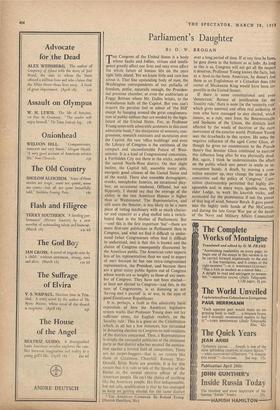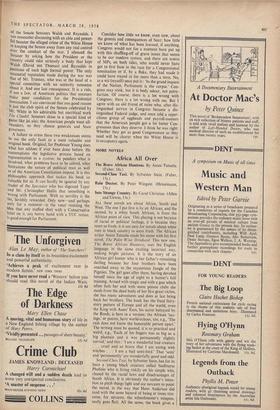Parliament's Daughter
BY D. W.
BROGAN
THE Congress of the United States is a body whose faults and follies, virtues and intelli- gence greatly affect our lives and may even affect the whole future of human life on the once tight little island. Yet we'know little and care less about it. That fine upstanding body of men, the Washington correspondents of our palladia of freedom, prefer, naturally enough, the Presiden- tial presence chamber, or even the auditorium at Foggy Bottom where Mr. Dulles brinks, to the orotudinous halls of the Capitol. But you can't acquire the peculiar feel or odour of 'the Hill' except by hanging around the great conglomera- tion of public edifices that are needed by the legis- lature of the United States. For, as Professor Young notes with admirable acuteness in this most admirable book,* the dissipation of senators,.con- gressmen, research assistants and secretaries over the Capitol, the vast `office buildings' and even the Library of Congress is the antithesis of the compact and uncomfortable Palace of West- minster. It is a kind of Congressional concession, a Forbidden City out there in the sticks, outwith the sacred North-West district. On that slight incline, the Capitol hill, assemble many able, energetic good citizens of the United States and of the world. There also assemble demagogues, crooks, xenophobic fanatics, an occasional play- boy, an occasional madman. Offhand, but not flippantly, I should say that the average of the ability in the two American Houses is higher than at Westminster. The Representative, and still more the Senator, is less likely to be a mere piece of voting machinery with as much charac- ter and capacity as a plug stuffed into a switch- board than in the Mother of Parliaments. But —and this is the first important 'bur —there are more first-rate politicians in Parliament than in Congress, and what we find it difficult to under- stand , (what Congressmen often find it difficult to understand, too) is that this is known and the claims of Congress consequently discounted by the American public. The American voter expects less of his representatives than we used to expect of ours because he has one extra-congressional representative, the President, and because there are a great many public figures out of Congress whose words are as weighty as those of any mem- ber of Congress. They have not been elected— at least not elected to Congress—and this, in the eyes of Congressmen, is as damning as not `having met a payroll' is, or was, in the eyes of good Eisenhower Republicans.
It is, perhaps, a fault in this admirably lucid exposition of how the American legislative system works that Professor Young does not lay sufficient stress, for English readers, on the 'locality rule.' This is a gloss on the Constitution which, in all but a few instances, has succeeded in debarring election to Congress to non-residents of the districts concerned. Thus, a Representative is simply the successful politician of the dominant party in that district who has secured the nomina- tion against a limited field of competitors. There are no , carpet-baggers—that is, no careers like those ,of Gladstone, Churchill, Ramsay Mac- Donald, ernie Bevin are possible. It is for this reason that it is vain to talk of the Speaker of the House as the second elective officer of the American people. He isn't the choice of anything like the American people. His first indispensable, but not sole, qualification is that he has managed to keep on getting elected for the same district
* THE AMERICAN CONGRESS. By Roland Young. (Hamish Hamilton, 36s.)
over a long period of time. If at any time he loses, he goes down to the bottom as at ludo. As long as this is so, Congress will not get all the respect it deserves. Professor Young knows the facts, but, as a bred-in-the-bone American, he doesn't feel them as an Englishman or a Canadian does (the career of Mackenzie King would have been im- possible in the United States).
If there is some constitutional and even `democratic' flavour of justification for the 'locality rule,' there is none for the 'seniority rule' which gives nominal and often real authority to men who have managed to stay elected, which means, as a rule, men from the Bournemouths and Seahams of the Union, the districts least affected by the winds of doctrine or the mere movement of the exterior world. Professor Young sees the drawbacks to this system. He notes the negative influence of the aged Carter Glass, al- though he gives no countenance to the Pravda theory that Senator Glass continued to exercise this influence long after he was physically dead. But, again, I think he underestimates the effect on the public which sees power in senile or in- competent hands. A death, by moving a com- mittee member up, may change the tone of the committee and .the policy of 'Congress.' Com- mittee chairmanship permitted that highly dis- agreeable and, in many ways, ignoble man, the elder Lodge, to work his knavish tricks; and accounted for the prominence if not the power of that bag of wind, Senator Borah. It gave power into the highly unfit hands of Pat McCarran, and during the late Great War put at the heads of the Navy and Military Affairs Committees of the Senate Senators Walsh and Reynolds. I can remember discussing with an able and power- ful Senator the alleged crime of the White House in keeping the Senate away from any real control over the conduct of the war. I silenced the Senator by asking how the President or the country could take seriously a body that kept Walsh (David not Thomas) and Reynolds in Positions of such high formal power. The only senatorial reputation made during the war was that of Mr. Truman, who was at the head of a special committee with no seniority nonsense about it. And one last consequence. It is a rule, if not a law, of American politics that senators make poor candidates for the Presidential nomination. I am convinced that one good reason is just the club spirit of the Senate celebrated by Mr. White in his admirable but uncritical work The Citadel. Senators shine in a special kind of game like jai alai; the American people want all- rounders, so they choose generals and State governors.
A failure to stress these two weaknesses seems to me the only fault in a most valuable and original book. Original, for Professor Young does what has seldom if ever been done before. He contemplates the legislative process based on representation as a system; he ponders what is involved, what problems have to be solved, what limitations the nature of political man as well as of the American Constitution impose. It is this philosophic approach that makes his book so valuable for us. It can hardly be ignored by any reader of the Spectator who has digested Taper and Mr. \Christopher Hollis that something is wrong with Parliament. With us servility is the sin, lavishly rewarded. Only now—and perhaps only for a moment—is the voter resisting the idea that any stuffed shirt with a Conservative label on it, any horny harid with-a TUC tattoo, is good enough for Parliament.
Consider how little we know, even now, about the genesis and consequences of Suez; how little we know of what has been learned, if anything. Congress would not for a moment have put up with this shuffling-off of grave issues that seems to be our modern system, and there are scores of MPs, on both sides, who would never have got to first base in the race for a Congressional nomination or if, by a fluke, they had made it could have stayed in for more than a term. No, as a wit (myself) once put it : 'In the grand inquest of the Nation, Parliament is the corpse.' Con- gress may stink, but it is body odour, not putre- faction. Of course, there is a lot wrong with Congress; there is a lot wrong with me. But I agree with an old friend of mine who, after dis- tinguished service in Congress became a dis- tinguished Federal judge, and once told a super- cilious group of eggheads and payroll-meeters that the American people got a lot better Con- gressmen than they deserve. I think he was right. Whether they get as good Congressmen as they need will be clearer when the White House is in occupancy again.











































 Previous page
Previous page